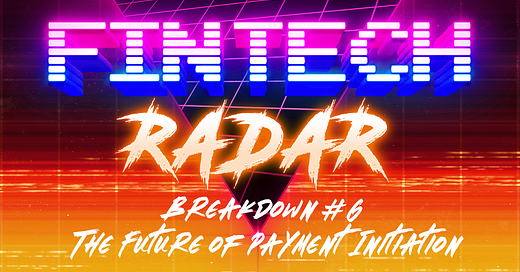
Discover more from Fintech Radar
Issue #96: India's UPI Makes Plans To Go Global, Stripe Quietly Makes An Acquisition, And Trump Isn't A Fan Of CBDCs
👋 Hi all, I hope you’ve had a great week.
A big shout-out to our loyal subscribers and a hearty welcome to the new faces — we're ecstatic to have you here!
If you’re new to Fintech Radar, this is what you can expect from each issue:
A curated round-up of the most interesting and relevant news from the world of fintech. In each issue, I focus on what caught my eye from the previous week — so don’t expect a weekly smorgasbord of press releases and partnership announcements. The aim is to serve only the meaty bits in a neat, nibble-worthy package. It's all about spotlighting the head-turners and giving you the nitty-gritty without the fluff.
Also, if you enjoy this issue, please share it with a friend. I’m sure they'll appreciate it!
As always, it’s been a busy week for fintech, so without further ado, let's delve into the major happenings from last week.
📣 The News Grab Bag
⤷ Apple Offers EU Set Of Pledges Aimed At Settling Apple Pay Antitrust Probe
Apple has offered a set of commitments to the EU in an effort to settle an antitrust probe into its mobile payment tech, Apple Pay. The EU probes suggested that Apple unfairly favoured Apple Pay and limited the ability of rivals to develop competing contactless payment offerings on its mobile platform.
Apple's proposed commitments include allowing third-party mobile wallet providers access to NFC functionality on iOS devices without having to use Apple Pay. However, access to the secure element would still be restricted. The EU is seeking feedback on Apple's offer before deciding whether to accept it.
🥡 Takeaway: Banks and third parties have complained to regulators about Apple limiting access to their secure element (a secure chip in the iPhone) in several markets. For example, here in Australia, the big four banks cracked the sads with Apple about the vig they charged for access to Apple Pay and complained to the local competition regulator back in 2017 — and were denied the ability to collectively bargain with Apple over access and pricing.
Fast forward to 2024, and Apple has bent the knee cleverly to the EU to avoid further scrutiny from regulators. To understand what they’re doing, you first need to understand that Apple Pay is powered by several clever innovations combining hardware and software. For those interested, you can find a simple explanation of how they operate on the Apple website.
What Apple is proposing to give access to is the NFC controller (more commonly referred to as Host Card Emulation (HCE) mode) via APIs. As you can imagine, there are a number of ways this could play out. Apple could provide ‘access’, maybe not great access, via some janky APIs (SOAP APIs, anyone?). To be clear, I don’t think they’ll do this, but the point is that the robustness of these APIs is still an open question.
But the way I think this actually plays out is that most consumer fintech players don’t spend the engineering cycles to build a side-loadable wallet. I mean, why bother when you can drop a pre-paid card, ID or other wallet item into an Apple Wallet and boom, you’re done and all for a few cents?
Let’s not forget that Google opened up access to HCE as part of Andriod 4.4 ‘KitKat’ in 2014, and I’m not sure this resulted in any real challenge to Google Pay’s dominance on the Android platform.
⤷ India’s UPI Gets A Boost In Its Quest To Go Global
Google Pay has teamed up with United Payments Interface (UPI) to expand the Indian payment rail beyond India, with the aim of making payments outside the country more convenient for Indian travellers and paving the way for UPI-inspired payment systems in other countries.
The tie-up also supports the simplification of remittances by reducing dependence on conventional money transfer channels, which is important given that India's remittance inflows reached $125bn in 2023, the highest in the world.
🥡 Takeaway: Back in early 2023, when MAS and the RBI announced the launch of real-time payments between the two countries, we saw the first hints that the vision for UPI was more than just a local payment rail.
I think this partnership is a bit of a red herring. I mean, when has a Google partnership on the fintech front ever actually resulted in anything? Having said this, directionally, I’m bullish on this move. UPI has been a phenomenal example of how an open platform across payments and identity can drive net new adoption of digital payments in a market.
As a thought experiment, imagine if the Indian UPI was focused on an interconnected faster payment rail across the subcontinent and down into ASEAN. Now, that’d be a game changer for commerce in these high-growth markets.
Octane, a company that builds billing infrastructure to support consumption-based pricing, last week announced that it is being acquired by Stripe.
According to the announcement on Octane’s website, the two companies share a vision and passion for building a billing platform that supports a diverse range of pricing structures and enables companies to iterate on their pricing easily.
🥡 Takeaway: In many ways, it’s not surprising that Stripe is looking externally to bolster its billing product, and it’s also emblematic of the broader issue that Stripe faces outside of its core payments product.
What started as a hyper-focused offering that was the easiest way to take payments online has morphed into a product set that includes everything from company incorporation to BaaS. In fact, their product drop-down menu is starting to look more like the infamous AWS drop-down menu. The number of adjacent offerings to its core product has ballooned, and along with that, I’d imagine the complexity of running so many disparate offerings.
On the face of it, many of the products they offer make total sense — radar, which takes advantage of their data to prevent fraud, billing to make it easier to get an invoice out and so on. But what has ended up happening is that in an attempt to service the indie SaaS founder right through to the D2C shop owner, they’ve created a set of products that are, well, middling. This is why most companies quickly graduate from the Stripe ecosystem and use products more tailored to their specific needs.
My guess is that when Stripe finally files to go public, many will be surprised (or maybe not) at how small their business is outside of payment processing.
The upside for Stripe is that now is the time to make strategic acquisitions to bolster their sidecar offerings.
⤷ Accel-KKR to Acquire Accertify from American Express
AmEx has announced its agreement to sell Accertify, a fraud prevention firm that offers online fraud monitoring services to merchants, to Accel-KKR. Accertify, based in Illinois, provides e-commerce fraud prevention solutions and has clients in various industries, including online retail and sports betting.
AmEx initially acquired Accertify in 2010 for around $151m. The sale is expected to close in the second quarter of 2024, and the terms of the deal have not been disclosed. According to the press release, Accel-KKR plans to support Accertify's growth and product innovation in the global fraud prevention market.
🥡 Takeaway: The fintech old heads might recall that Amex acquired Accertify in 2010 for $150m. According to the press from 2010 on the initial transaction by AmEx, Accertify provided fraud prevention to “…17 businesses in the Internet Retailer Top 500 Guide…” which include companies like Blockbuster and BarnesandNoble.com. Yep, that’s how long ago the transaction was.
The logic, which was sound (and actually fairly prescient), was that “…merchants increasingly want single-source platforms to address all types of transactions, regardless of the payment brand.”1 Obviously, this was going to be AmEx’s way to provide this.
However, over the last 13 years, this space has continued to heat up with a plethora of competitors entering the market. The intense competition from companies like Signifyd, Forter and Riskified has put pressure on the Accertify offering as it slowly looks more like a legacy solution.
This is the time to be snapping up solid businesses. In this case, Accel-KKR will need to do some serious product revitalisation. However, if done right, this could prove to be an astute purchase.
⤷ Donald Trump Promises to Block Digital Dollar Creation — Calls CBDC 'Dangerous Threat to Freedom'
Former US president Donald Trump has vowed to prevent the creation of a central bank digital currency (CBDC) if elected. He claimed that a digital dollar would give the federal government "absolute control over your money" and warned that the government could take people's money without them knowing.
Trump called the potential for a CBDC a "dangerous threat to freedom." While some lawmakers share Trump's scepticism, others argue that a CBDC could be an effective solution to monetary policy issues. The Federal Reserve has not yet committed to creating a digital dollar.
🥡 Takeaway: While other countries power ahead investigating a CBDC — with Bahamas, Jamaica, and Nigeria all having introduced one — the interest in the US seems to be losing traction.
Outside of Trump’s comments (which, let’s be honest, could change next week), scepticism seems to be rising around a CBDC in the US. As the article notes:
Fed Governor Michelle Bowman, for example, said in October last year: “I have yet to see a compelling argument that a U.S. CBDC could solve any of these problems more effectively or efficiently than alternatives, or with fewer downside risks for consumers and for the economy.”
It’ll be interesting to see where the US lands on CBDC. My guess is that in an environment where the government isn’t exactly the most trusted entity, it could be a real uphill battle for a CDBC to see the light of day in US.
💸 Notable Funding Announcements
Last week saw an uptick in fintech financing, with 55 funding rounds completed and companies collectively securing $930m in investment.
⤷ Pomelo stacks $40M to scale its payments infra business in LatAm
Argentinian payments infrastructure startup Pomelo has raised $40m in a Series B round of funding. The company provides fintech startups and embedded finance players with a way to launch virtual accounts and issue prepaid and credit cards through compliant onboarding processes.
Pomelo has expanded its services beyond Argentina to Mexico, Brazil, Chile, Colombia, and Peru, allowing local and international companies to offer their customers prepaid, debit, and credit cards. According to the article, the startup has over 100 corporate clients and has experienced significant revenue and payment volume growth. Pomelo plans to use the funding to focus on expanding in Brazil, Mexico, and Colombia.
🥡 Takeaway: If you’re a reader of FR, you know some of the headline stats about LATAM on the fintech front. As a reminder, it’s still a relatively cash-heavy region (~80% of transactions are cash-based), and the unbanked and underbanked are around 50% of the market. Having said this, it’s rapidly changing, and along with this, there is a growing demand for embedded finance solutions.
Unlike more heavily banked (and arguably overbanked markets) like the US, there is a growing opportunity for the regional tech players to further enhance their overall value proposition by incorporating financial services. As the article notes, Pomelo is already working with some of the more prominent names in tech across LATAM on this front — namely Rappi, Bitso, Stori, Nomad, PayJoy, Ripio and AstroPay.
In many ways, I’m more bullish on embedded fintech offerings (dare I say super apps) in high-growth markets where the population is rapidly entering the world of digital payments through their interaction with tech platforms that offer e-commerce, ride-sharing and other digital experiences.
⤷ Carmoola secures a further £15.5M investment to change the future of car financing
London-based fintech Carmoola has raised £15.5m from multiple investors, including QED Investors, VentureFriends, and InMotion Ventures. This investment adds to the £95m debt facility from NatWest and the £8.5m Series A round that Carmoola previously secured.
Carmoola offers personalised car finance options directly to consumers through its platform, which includes budgeting tools, vehicle history checks, and online payment options. With the new funding, the company plans to expand its offering and reach more car buyers.
🥡 Takeaway: It’s always fascinating to see tired segments get some love from startups, and I can’t think of a more tired one than car financing. In some ways, there is little to innovate at the core of this product — at the end of the day, the consumer just wants the quickest and cheapest rate on their loan.
One of the more under-discussed things in financial services is the ‘death by a thousand cuts’ experiences that we’ve all just learned to live with. Whether it’s providing ID documents or payslips numerous times during a loan application or payment methods that still involve cheques — which are all small things — that, when added up, can really make a difference to an interaction with an FI.
It’s always great to see players like Carmoola work to remove all the sharp edges that most experience when dealing with a car loan.
🎧 Resources & Recommendations
⤷ Sardine: The Fraud Fighter's Toolkit
On this episode of Contrary’s Research Radio, Soups Ranjan, CEO of Sardine, discusses fraud prevention in online transactions. More specifically, he talks about the challenges of combating fraud with generative AI and the application of behavioural biometrics. Ranjan also addresses future risks, opportunities, and trends in the anti-fraud industry. As always, Ranjan brings the heat, and this is another episode on Sardine well worth listening to.
⤷ The Story of Nubank, The World’s Largest Neobank with Co-founder Cristina Junqueira
Cristina Junqueira is the co-founder of Nubank, and on this episode of the Peel she shares the story of the Brazilian neobank’s rise, from its humble beginnings in a house in Sao Paulo to becoming backed by investors like Sequoia, Founders Fund, and Warren Buffett.
As a reminder Nubank, started by launching a no-fee credit card (which Cristina discusses on this pod) and has moved on to launching other banking products across Brazil, Mexico, and Colombia. Cristina discusses the challenges of navigating government regulations, the importance of Nubank's distinctive brand, and how they were able to spend $0 on marketing for most of their history.
❤️ Show Some Love For FR
📧 Feel free to reach out if you want to connect — I'm @alantsen on Twitter.
Ps. If you like what I'm doing with FR, please share it on your social disinformation network of choice. I'd also appreciate it if you forwarded this newsletter to a friend who might enjoy it.
🙏 What did you think of this week's issue of FR?
I love it! ◌ I Like It ◌ Not Bad ◌ I Don’t Like It ◌ It’s Awful
A quote from Bill Glenn, president of American Express Global Merchant Services, that appeared in the article “American Express to buy fraud prevention vendor Accertify” (Digital Commerce 360, 2010).













